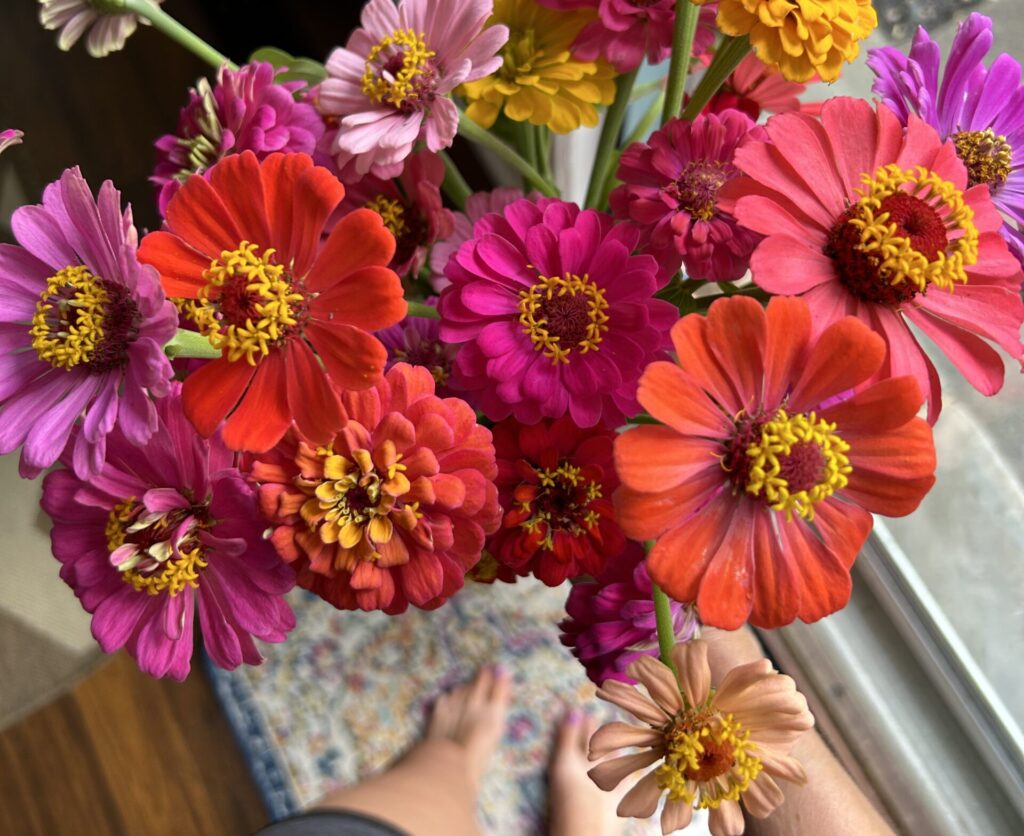When plunking piano keys and singing at the top of my lungs turned to boredom, I asked to go outside. “Sure, baby. By the way, there’s watermelon in the fridge and Whitehouse Cherry Ice Cream in the freezer,” my Mamaw said in her Kentucky-born accent.
I dashed out the garage door, my pastel dress and wavy blond hair blowing behind me, pausing only to sniff the sweet nectar of every blooming red, pink, and yellow rose. Then I worked my way around the side of the house to the giant white rose bush. I watched as bees buzzed between blooms. Satisfied, I headed toward the strawberry patch, lighting up at the sight of ruby red berries hidden under vibrant green leaves. The sweet yet sour strawberry juice left evidence on my fingertips as I tossed the stem into the grass.
My Mamaw’s backyard was like something out of a dream, but it was her garden at the bottom of the hill that drew me in most, like a well-acquainted friend who knows all your secrets and still loves you. The hot summer sun shone down from a baby blue sky stretching as far as I could see as I made my way down. The snap-dragons were my favorite with their exotic-looking petals, like little faces staring back at you. I used to pick them, squeezing them between my fingers to make them talk.
Here, I could simply be a child; I could make friends with horses in the farm behind me and with the yellow finches in the trees. I was safe and sound to forget that daddies can leave and mommies can fall apart. As my world cracked open like an egg and I watched all that was good and right flow out, my mind sought refuge in my Mamaw’s “English” garden. While she washed dishes inside, occasionally checking on me from her bedroom window, I soaked up the gift of all her toiling.
//
In my late-twenties, I planted my first cut-flower garden. Truth be told, I never consciously planned this. I think something from deep within called me back to my girlhood—to the place I felt most at peace, the place where safety reigned despite the chaos that consumed my childhood.
It all started during a random trip to the local garden center on a sunny spring morning. I walked down the aisles, not sure what I was looking for. The bag in front of me claimed to hold everything in it to cultivate wildflowers. Of course I grabbed it; I’m not some kind of monster. I followed the instructions, sprinkling seeds and fertilizer into the earth I tilled by hand. I watered and waited.
As seeds sprouted underneath, new life began to form right under my nose in another hidden place. Just as the dirt made room for roots, my body shifted to carry and sustain a child. I felt the cramping in my pelvis as a baby took up residence, holding on for dear life.
When the nausea rushed in with such fierceness that I found myself couch-ridden and the fatigue made napping at 9am a normal occurrence, there was no denying this baby’s existence. Like the sets of two small leaves spread throughout my garden bed, this child was real, alive, and begging to be seen—to be known and nourished.
We took pictures on Memorial Day that we’d later use to share about this pregnancy. As symptoms faded though, fear clung closer than my husband in that picture. Underneath the red hair and awkward bangs on my forehead was a mind at war—a woman grasping desperately to her baby. Stay awhile, sweet baby. Don’t leave.
//
I sat on the back patio—the place that had become a sort of oasis from grief. The sun warmed my skin as fluffy white clouds rolled by.
My baby did leave. My womb had morphed into a black hole that filled up my abdomen, threatening to swallow me. My hand lingered there where my baby once lived as I wrote Scripture in journals in an effort to believe them.
A flash of color waved in the wind in my peripheral vision. A zinnia, bright and blazing, alive and well, pointing me to the God who sees, the God who trampled death. “Already, but not yet,” they say. It was the “not yet” that plagued me. I was a woman who felt death take place in my own body. I witnessed blood like a siren calling out, “Death is here! Life is fading! Life will lose!”
But this flower, with its delicate petals and circle of yellow florets in the middle, declared to me a different tale. That day, I needed its story. As each new pregnancy ended in empty arms and the walls of our home echoed with the silence of babies gone too soon, I would continue to need it—the old, old story of how Jesus trampled death.
Two summers that held too much grief also were the summers that brought the joy of watching seeds turn to blooms. This little garden became a haven and a memorial for me of the God who conquered death—the God who sees. The God who gives good gifts.
//
“Mommy! Can we pick flowers?!” My three-year-old loves taking pictures with flowers. I know one day he’ll grow out of it, and I’ll likely cry. As I watch his little hands point to the biggest blooms for me to cut and then place them in a vase filled with water on the bricks behind us, a bitter-sweetness hovers in the air above me.
I have two sweet boys whom I adore, but the void of never knowing the three children who came before them still aches sometimes. Were they all boys, or was there a girl? I always wanted to have a little girl. Did they have blue eyes like their brothers? What would it be like to hold their tiny hands? I don’t know them, but I miss them.
I’ve been planting zinnias every year for seven years. What started out as tossing seeds into the ground and hoping for the best has become a sort of memorial for the babies I lost. My garden has been a balm during many sorrows since then. It’s a place I go when I need to breathe, to reflect, to believe, and to remember.
For years I’ve kept the bouquets from my garden for my own pleasure. But today, my son and I are gathering zinnias that burst with colors of merlot, hot pink, and coral. I carefully arrange them in a mason jar to give to a friend. I know the gifts forged in grief were never meant to be kept to ourselves.
As I look at the colors waving in the wind and various kinds of bees gathering yellow on their thin legs, I know the joy found in giving away the things we hold close to our hearts. The grief that brought me to this point was not good, but through the fire of suffering God molds gifts. He takes sorrow and shapes it into compassion for others. He uses loss to spur us on to love. He gave me flowers so I could give them away.
//
A zinnia brought me back home, to my roots. Every day during my baby’s nap, I take to my garden while my oldest son plays in the sprinkler. I water, cultivate, and cut back. I watch butterflies and hummingbirds and fuzzy bees drink from the flowers. More gifts forged in grief. I marvel at the beauty and handiwork of the Lord, both in my garden and in my life.
I’m beginning to understand more and more each day why my Mamaw enjoyed her garden so much—why I’d find her holding coffee in a porcelain mug, sitting on a white chair among her flowers each morning. I know her wise eyes have seen much sorrow. I wonder if it was grief that led her to put her hands to the ground. Perhaps she never knew that one packet of seeds would turn into a beautiful garden where a child would find comfort. I bet she never dreamed of a legacy implanted in her first granddaughter when she tilled the rocky earth beneath her.
Maybe one day I will have a granddaughter, and we’ll sit together in my own quaint garden, surrounded by beauty and peace. Maybe we’ll talk about God and school and things that break her heart or make her happy. I’ll tell her the story of gifts forged in grief—of a little girl, a broken childhood, babies gone too soon, a garden, and the God who cares about it all. Maybe it will be a gift to her that she won’t know she holds in her heart until much, much later.
When death had swooped down
like a magpie,
she wondered if goodness ever stayed.
She feared hope wouldn’t come.
Yet in the corner of her eye,
pink waved in the wind,
as if to say “hi.”
And a zinnia led her home.


3 Responses
Beautiful, Brittany! What a lovely portrait of hope and grace. And zinnias! 🙂